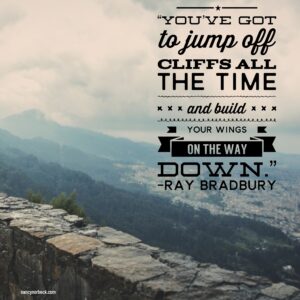 I was talking to a coaching colleague yesterday, and she said something that, I realized, may also be something people are thinking as they consider taking my Intuitive Writing course.
I was talking to a coaching colleague yesterday, and she said something that, I realized, may also be something people are thinking as they consider taking my Intuitive Writing course.
“I looked at your site and the page for your book, and as I read the description, I said to myself, ‘Wow. I never would come up with that…'”
Now, this is a woman with plenty of her own artistic gifts, so she’s not exactly short on creativity, but not as much in the writing realm. And she was assuming that this whole idea came to me at once. Nothing could be further from the truth, as I explained.
A month or so before I went off to my first MFA residency at Goddard College, I realized I hadn’t written much for a few weeks. Immediately, my brain went into Impostor Syndrome. I was about to go off to start a writing degree. What kind of writer was I? Could I even call myself a writer at all?
Fortunately, my response was not to freak out and withdraw from the program (that temptation came later!) but to go in search of inspiration. I found a page that used first lines as writing prompts, and found this one:
The baby had been born with ___________.
My brain automatically said, “a silver spoon in its mouth.” I completely wrote it off. “Augh. That’s no good. You can’t be born with a silver spoon in your mouth.” I needed something better, but what?
Then a tentative voice in the back of my head said, “But what if you were?” I suspect this was the result of reading far too much Neil Gaiman, but wherever it came from, it shifted everything. What would happen if you really were born with a silver spoon in your mouth? Who would you be? Why would you be that way? Those and a million other questions started racing through my head (you can read about these questions and how they work in this Ask Nancy post) and the next thing I knew I had the first page of…something. And four characters—the doctor who was narrating, the baby, and her parents.
Who were these people? I did not know. I knew nothing. I can’t stress this enough. I literally had no idea what I was doing, what I was looking at, where it might go, or even if there was any point doing much with it because I had no idea what was to come at Goddard.
At Goddard, I was told to start a new project for my thesis, so I decided to write a collection of short stories; I figured it would give me the flexibility to try a lot of different ideas. I played with the silver spoon idea but couldn’t get it to gel, so I tucked it away as an insurance policy; if I needed something and inspiration hadn’t struck, I’d hand the seventeen pages of I-don’t-know-what-this-is over to my advisor.
Halfway through the semester, that moment came. I sent them off and was totally honest. I told her it wasn’t a completed draft because I had no idea whether it was a short story or a novel, or what was happening aside from very general terms. She wrote back and said, “It isn’t a short anything,” and suggested that it would make a great thesis novel if I wanted to go in that direction. I was floored.
The decision that had to be made quickly, because I was already six weeks into the semester and didn’t want to lose any more time than I already had. I thought about it for about a week and decided to run with it.
 Ray Bradbury once said, “You’ve go to jump off cliffs all the time and build your wings on the way down.” And you do build those wings, but you’re in free-fall, so all the time the ground is rising up to meet you. FAST.
Ray Bradbury once said, “You’ve go to jump off cliffs all the time and build your wings on the way down.” And you do build those wings, but you’re in free-fall, so all the time the ground is rising up to meet you. FAST.
There were questions to ask—and answer. BIG questions. There were characters I barely knew, and others to come that I had no idea about yet at all. And yet, this is always how writing works for me, because I jump without wings all the time. If I had wings—an outline, synopsis, etc.—I’d know how the story ends, and would have no need to write it. So for me, it was not entirely alien territory. It was just more frightening because it had deadlines and semesters and tuition attached to it. What’s more, if I didn’t finish it—if I was in way over my head—I might not know in time to save myself a lot of stress and maybe even an extra semester.
Fortunately, over the next two years, my advisors and I asked the right questions, I found the answers, and I finished in time. Characters, events, plot points all managed to happen at pretty much the right moment. Was it stress-free? Was it perfect? NO. But it was good enough, and I spent more time revising it after graduation.
Writing, for a lot of us, is about discovery and adventure. I need to discover a story, and that’s an adventure. You may start with the beginning and think you know where it’s going, only to find that you were wrong. You may think you know your characters, and discover that they have other plans—yes, really, and no, it’s not uncommon, so no, it doesn’t mean you’re crazy. What it does mean is that you’re along for the ride, and things will come to you as you need them. And you can go back and change them later if it ends up that something doesn’t quite gel the way it should (and it won’t, and that’s okay, because that’s what revision is for).
You may have heard that you shouldn’t compare your Chapter 1 to someone else’s Chapter 20. That’s good advice. So as you look at the page for my book, or anyone else’s book, or a new movie, or a new dress design, or whatever it is that you might want to try, please remember that we all start at the beginning. We all stare into the blank page, and it stares back into us.
The only thing we have to do to defeat it is to keep putting words on it.
